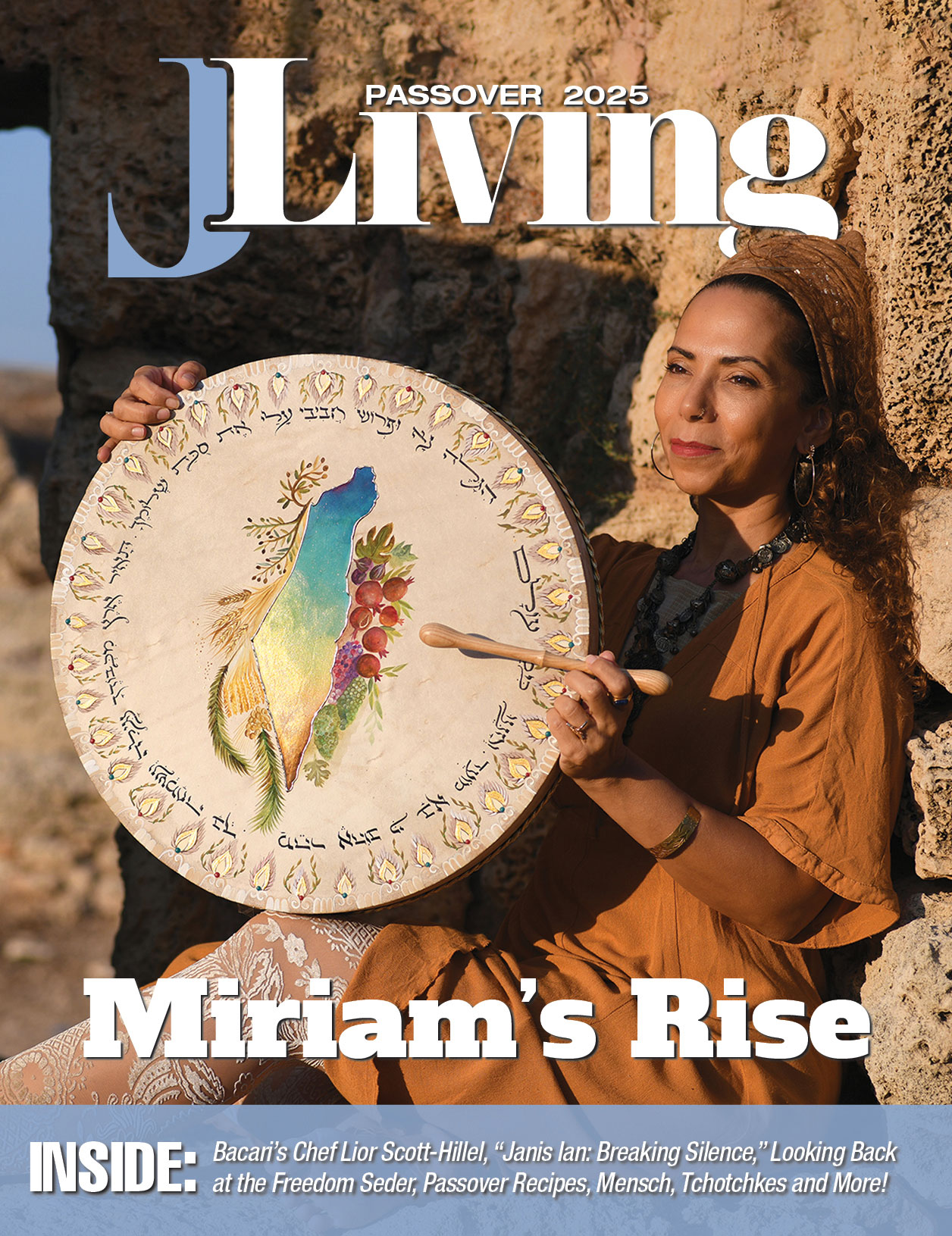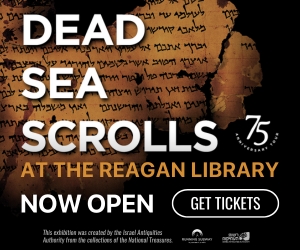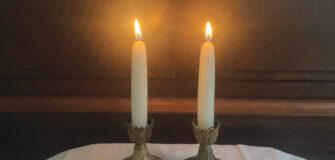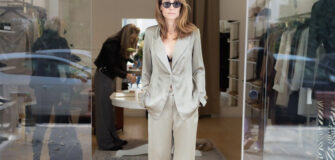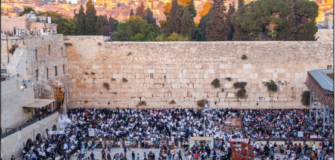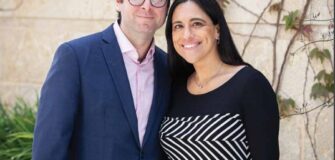Synagogue Life Finds a Way
As the Pandemic Goes on, Synagogue Life Finds a Way

Two years into the pandemic, congregations are transitioning back to some semblance of normalcy while keeping in place adjustments made because of COVID-19. The goal driving everything has been fostering a strong sense of community.
MEETING OUTDOORS
Early in the pandemic, when government officials announced places of worship were prohibited from gathering indoors, Los Angeles Jews got innovative. Walking around Pico-Robertson, a predominately Jewish neighborhood, it was not uncommon to find minyans taking place in residential neighborhoods.
B’nai David-Judea (BDJ), an observant and progressive congregation, is one of the few large congregations in Pico-Robertson without an outdoor space.

“We have had to use our community member’s spaces creatively,” BDJ Executive Director Adynna Swarz said. “This year, our banquet honorees were chosen for exactly this reason. One helped plan and implement our outdoor minyanim when that’s all we could do and the other has been lending her backyard for a myriad of programs for the past two years, including outdoor prayer services and kids programs.”

At many non-Orthodox shuls, in-person Shabbat services are taking place, while those uncomfortable with returning in-person log in on Zoom, Facebook Live or YouTube.
“This hybrid model is likely here to stay, even beyond the pandemic,” Sheryl Goldman, executive director of Temple Beth Am, said.
At her congregation, a Conservative community on the eastern edge of Pico-Robertson, the daily morning minyan has resumed in the temple’s sanctuary, while people are able to participate on Zoom. Shabbat services follow a similar model. At Valley Outreach Synagogue (VOS), a nondenominational community in Calabasas, members have been congregating in backyards. Rabbi Sara Abrams, associate spiritual leader and chaplain at the synagogue, led these conversation groups.
“These talks were relevant to what people were going through,” VOS’s Rabbi Ron Li-Paz said.
VOS also continued holding its Hebrew school outdoors in
backyards, a practice it began before the pandemic. For a synagogue that had
gone for decades without a permanent home until the acquisition of a property
in 2017, this longstanding approach of “we’ll come to you, instead of people
coming to the synagogue,” has proved beneficial, Li-Paz said.
MEMBERSHIP CHALLENGES
When the lockdown began in March 2020, Li-Paz worried his members would not see any reason to continue paying dues if they could not meet in person. However, the opposite occurred: for many, mandated social isolation increased the need for community among the temple’s members.
“We feared the value proposition of being in a synagogue would dissipate, and we’d lose funding, that members and donors wouldn’t be as invested,” the VOS rabbi said. “But people stayed with us, which has been heartwarming. We’re gaining new members, and that feels good.”
“One of the silver linings of the pandemic is people realizing they need community and spiritual life,” Li-Paz said.
Like VOS, Wilshire Boulevard Temple (WBT) was concerned its congregants would not continue to support the shul. The community, however, has been resilient.
“People have stuck with us,” Donald Levy, communications and marketing director at WBT, said. ”They appreciated the effort we have made to continue to serve them, whether it be our schools, our Shabbat services, our daily programming. There has been a lot of appreciation for what we have done to connect with our congregants. We’ve been doing okay. Doesn’t mean it is ever easy.”
PROGRAMMING
The pandemic created an urgent need for daytime virtual programming, serving both adults working from home and children whose schools were closed. However, now that many have returned to work and school, congregations have begun refocusing on live evening programs.
“We’ve done substantial daily and daytime programs, but people are now working during the day,” WBT’s Levy said.
WBT recently entered into a partnership with Live Talks Los Angeles to hold events. Upcoming discussions include a program with iconic journalist Carl Bernstein and another with television writer Michael Schur, all part of a new initiative called WBT Primetime. Beth Am Rabbi Adam Kligfeld, meanwhile, has offered virtual meditation twice per week, and he is now starting to lead meditation sessions once a week in-person. This is in addition to the four special interest groups Beth Am formed at the start of the pandemic. Of the four groups—Jewish World Travel; Sports; Sugar and Spice and Everything Shabbas; and Film Group—the film group was the most popular, Goldman said. The synagogue screened 70 films, with people watching them on their own then meeting on Sunday over Zoom to discuss them.
Additionally, the recent launch of a Green Team at Beth Am led congregants to take part in beach cleanups, hikes and online presentations.

“All things considered, Temple Beth Am has been doing quite well as we continue to navigate the pandemic,” Goldman said. “Aside from our schools, which are flourishing as they remain open, we have been fortunate to offer both in-person and virtual Shabbat services throughout.” Temple Ner Simcha, a congregation in Westlake Village blending Reform and Conservative worship with Hasidic teachings, has routinely brought together congregants outside of shul with the monthly program, Talmud and Tobacco. Between 25-50 people meet outdoors at the Stonehaus, a winery in Westlake Village, studying Talmud while enjoying, well, cigars.
Ner Simcha’s Rabbi Michael Barclay, who once consulted for cigar companies, started this program upon founding his shul seven years ago. “It’s always been an amazing outreach program,” he said. “It’s not about the smoking. It’s about the camaraderie. Half the people don’t even smoke.”
Sinai Temple has kept busy. Its popular The Ted (z”l) & Hedy (z”l) Orden and Family Friday Night Live, a monthly musical kabbalat Shabbat service and dinner for young professionals, returned about five months ago. “People just want to really be out and have a Shabbat experience that’s safe,“ Briana Benaron, director of Sinai Temple’s ATID young professionals programming, said.
Additional events at Sinai have included an outdoors “Java and Jelly Donuts” meet-up at the Original Farmers Market for those in their 20s and 30s. Soon-to-be-launched is a Chavurah program, helping to form tight-knit communities within the larger ecosystem that is Sinai Temple, one of the largest Conservative congregations in the city.
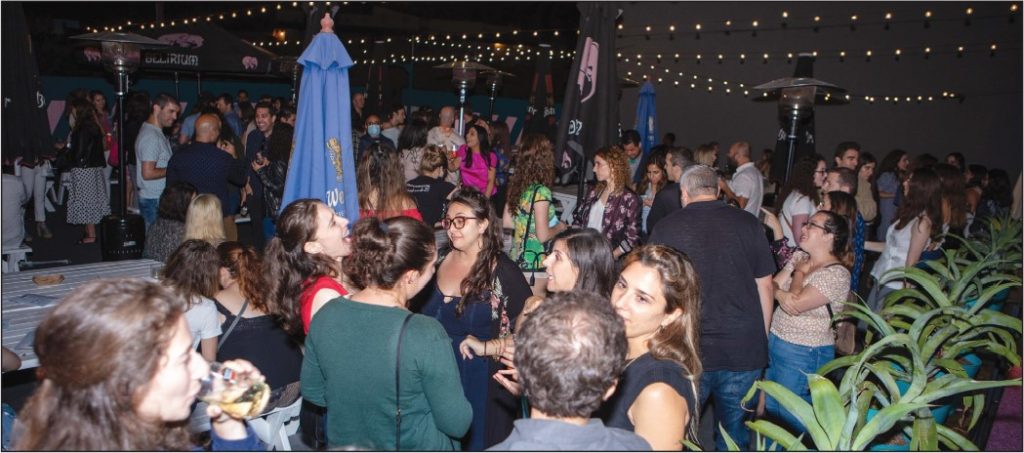
TIKKUN OLAM
For many, tikkun olam (“repairing the world”) is an entry point into Judaism, and it continued to play a role the past two years as synagogues found ways of supporting those outside their respective communities.
At Wilshire Boulevard Temple, the pandemic provided the opportunity to give back. Its Karsh Center supplied meals, hygiene kits, toys, personal protective equipment and vaccines to those in its surrounding Koreatown community, and the center strengthened its support for the neighborhood’s small businesses, Levy said.
B’nai David-Judea stumbled onto a way of helping out. The congregation has been serving as a monthly hosting site for American Red Cross blood drives, filling in for corporate workplaces that had previously served this role but couldn’t any longer once they were not meeting in person.
BDJ has held 13 drives benefiting the Red Cross, which meant 483 units of blood saving nearly 1,500 lives.
“Thankfully now it seems like more [workplace] sites are back to hosting,” Swarz said, “but we were so happy to be able to contribute in this way during the toughest of times.”
At Sinai, the Friday Night Live service has integrated schmoozing with social justice, kicking off the night with a “Pack with Purpose” action project for attendees.
After so much time spent at home, returning to shul has been the ultimate reward, Sinai Temple’s Benaron said.
“I think people have been really lonely and isolated,” she said. “People have had time to think about what matters to them and what they have missed, and I think Sinai Temple has prevailed in showing, regardless of what physical restrictions we experience in our city, we will go above and beyond to still create that sense of community and belonging.”

